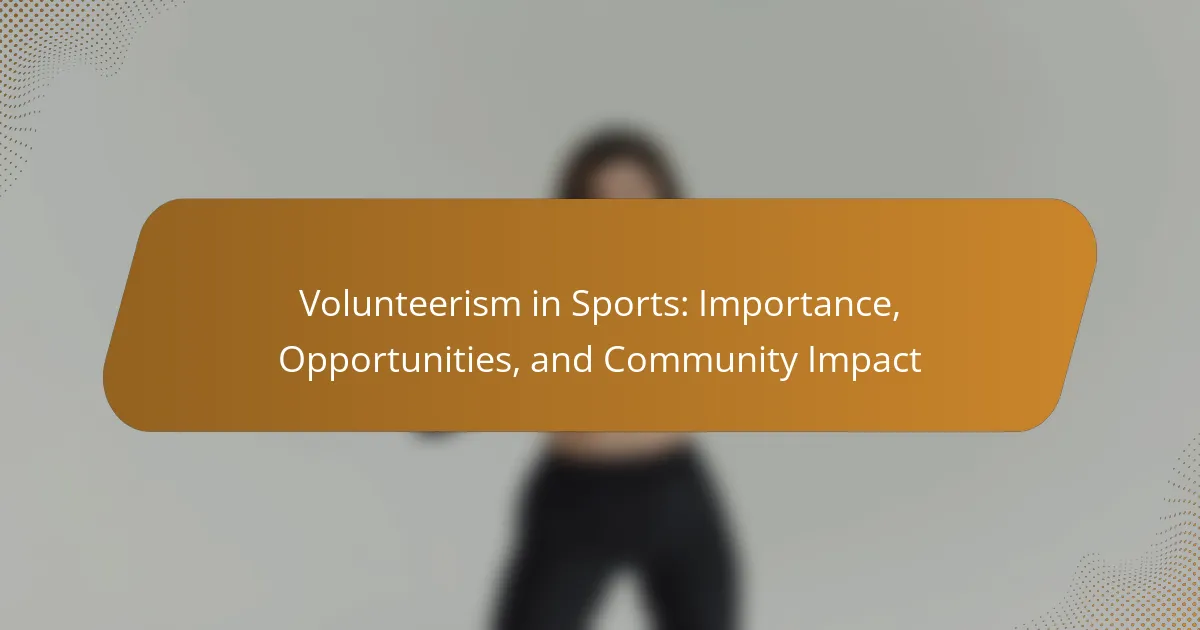Volunteerism in sports plays a vital role in fostering community engagement and enhancing participant experiences. This article explores the importance of volunteerism, the diverse opportunities available, and its significant impact on communities. It also addresses the challenges faced by sports volunteers and highlights evolving trends in digital engagement and sustainability.
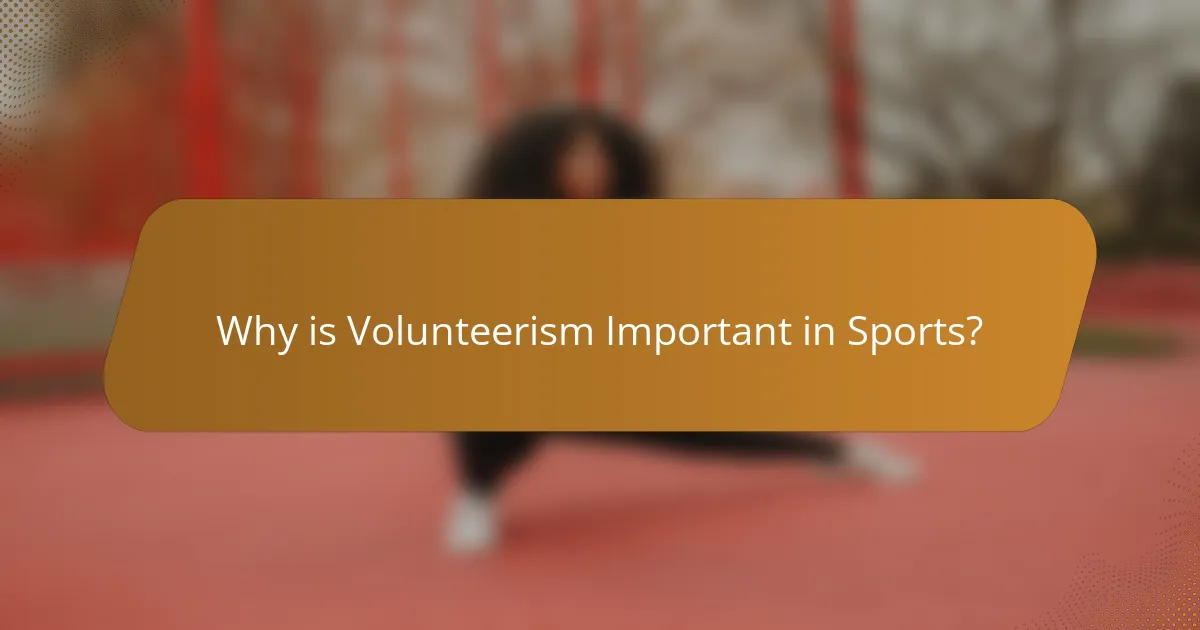
Why is Volunteerism Important in Sports?
Volunteerism in sports is crucial as it fosters community engagement, promotes teamwork, and enhances the overall experience for participants. Volunteers contribute their time and skills, leading to improved events and programmes. This involvement creates strong social bonds and encourages active lifestyles. Moreover, volunteerism in sports can provide unique opportunities for personal growth and skill development, benefiting both individuals and the community at large.
What are the key benefits of volunteering in sports?
Volunteering in sports offers numerous benefits, including personal growth, community engagement, and enhanced teamwork skills. Participants gain valuable experience, expand their networks, and contribute positively to society. Additionally, volunteering can improve physical health and mental well-being. Engaging in sports volunteerism fosters a sense of belonging and purpose, enriching both the individual and the community.
How does volunteerism enhance community engagement?
Volunteerism enhances community engagement by fostering connections, building trust, and promoting collaboration. It creates a sense of belonging and encourages active participation in local initiatives. Engaging in sports volunteerism can lead to increased community pride and improved social cohesion. These activities often result in a more vibrant community atmosphere, where individuals feel empowered to contribute to shared goals.
Which skills can volunteers develop through sports involvement?
Volunteers can develop various skills through sports involvement, including teamwork, leadership, communication, and problem-solving. Participating in sports programmes enhances organisational skills and fosters adaptability. Additionally, volunteers gain experience in event planning and community engagement, which are valuable in personal and professional contexts.
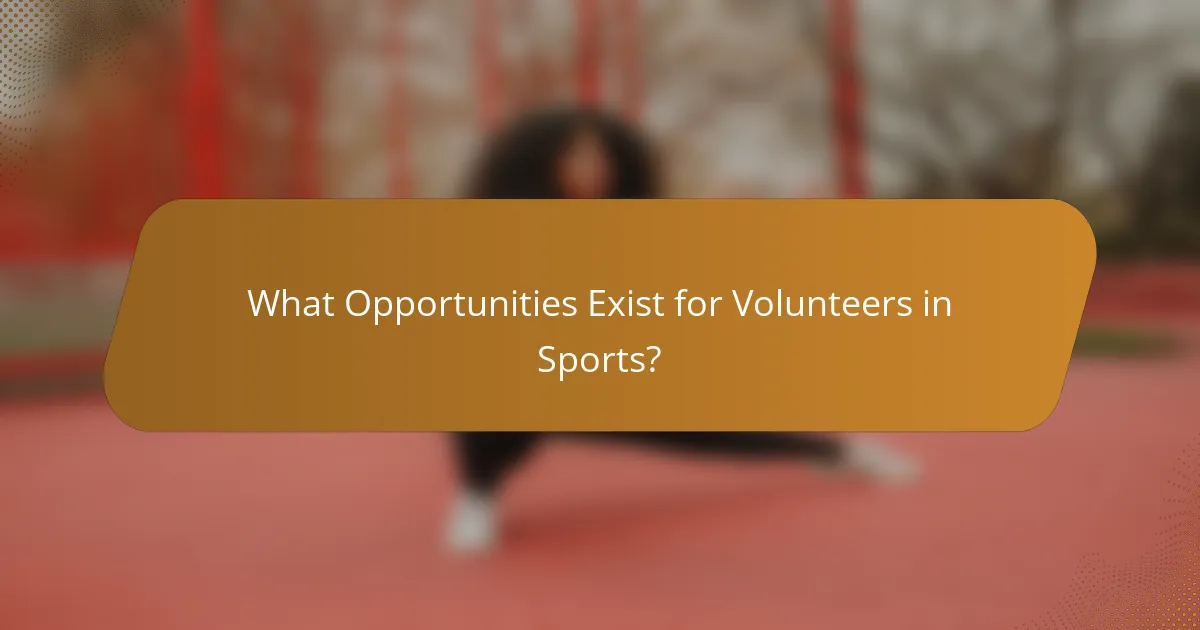
What Opportunities Exist for Volunteers in Sports?
Volunteers in sports have diverse opportunities that significantly contribute to communities. They can assist in organising events, coaching teams, or supporting youth programmes. These roles enhance community engagement and promote healthy lifestyles. Furthermore, volunteers often gain valuable skills, networking opportunities, and personal fulfilment through their contributions.
How can individuals find sports volunteer positions?
Individuals can find sports volunteer positions through various channels. Start by researching local sports organisations and community centres that often seek volunteers for events and programmes. Websites like VolunteerMatch and Idealist list opportunities tailored to sports. Networking within local sports clubs or attending community events can also lead to volunteer openings. Additionally, social media platforms often feature calls for volunteers from sports teams and events. Engaging with these platforms increases visibility and access to diverse volunteer roles.
What types of roles are available for sports volunteers?
Various roles are available for sports volunteers, including event coordination, coaching assistance, and administrative support. Volunteers may also engage in fundraising, marketing, and community outreach. Each role contributes uniquely to the success of sports programmes and events, enhancing community engagement and support. Opportunities vary based on the type of sport and organisational needs.
How do local organisations facilitate volunteer opportunities?
Local organisations facilitate volunteer opportunities by connecting individuals with sports initiatives that enhance community engagement. They organise events, recruit volunteers, and provide training. These organisations often collaborate with schools and sports clubs to create inclusive programmes. Additionally, they foster social connections, promoting a sense of belonging among volunteers while addressing community needs.
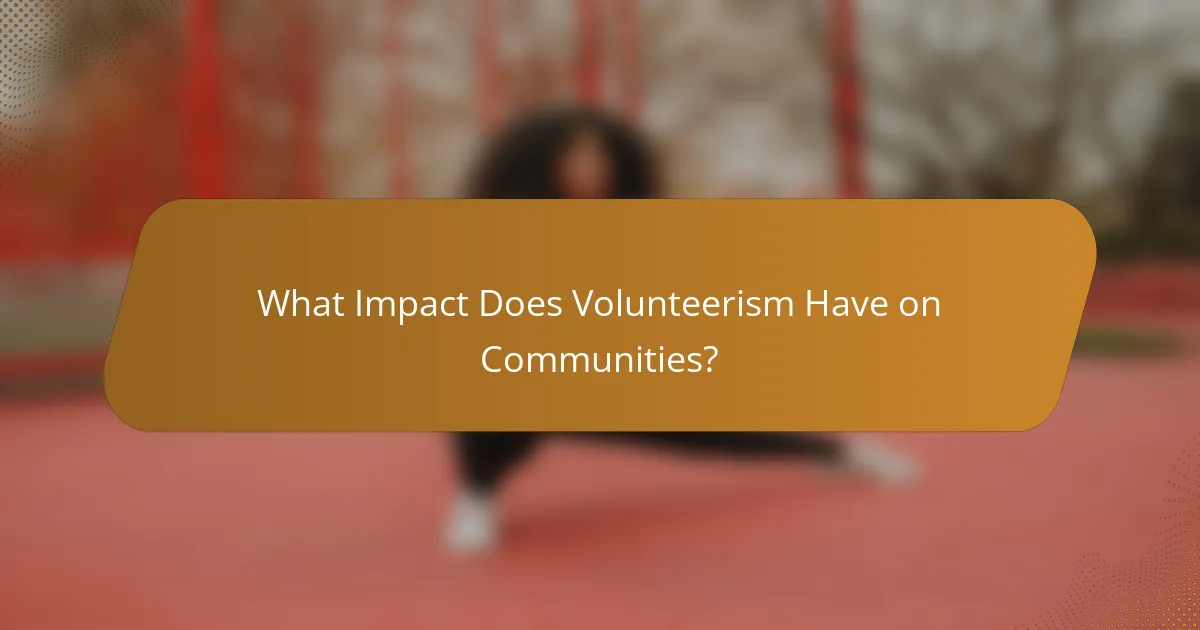
What Impact Does Volunteerism Have on Communities?
Volunteerism significantly enhances communities by fostering social connections, improving public spaces, and promoting civic engagement. It creates opportunities for individuals to contribute positively while addressing local needs. For instance, sports volunteerism encourages teamwork, develops leadership skills, and provides mentorship, benefiting both volunteers and participants. Community programmes often thrive on volunteer support, leading to increased resources and better services. As a result, volunteerism cultivates a stronger sense of belonging and shared responsibility within communities.
How does sports volunteerism contribute to social cohesion?
Sports volunteerism fosters social cohesion by uniting diverse community members through shared activities and goals. This collaboration enhances trust and mutual respect. Engaging in sports-related volunteer efforts cultivates a sense of belonging, as individuals work together towards common objectives. As a result, communities experience strengthened social networks and increased civic engagement. Furthermore, studies indicate that volunteerism in sports can lead to improved mental health and well-being, reinforcing community ties.
What are the measurable outcomes of volunteer efforts in sports?
Volunteer efforts in sports yield measurable outcomes such as increased community engagement, enhanced skill development, and improved health metrics. These contributions foster social cohesion and create lasting impacts on local sports programmes. For instance, studies show that volunteer-led events boost participation rates by up to 30%. Additionally, volunteers often report personal growth, including leadership skills and increased job prospects. Tracking these outcomes helps organisations assess the effectiveness of their initiatives and refine future volunteer strategies.
Which communities benefit the most from sports volunteer programmes?
Communities that benefit the most from sports volunteer programmes include underprivileged youth, local schools, and community sports clubs. These programmes enhance social cohesion, provide mentorship, and promote healthy lifestyles.
Underprivileged youth gain access to sports resources and opportunities for personal development. Local schools benefit from increased engagement in physical education, while community sports clubs receive essential support to organise events and activities.
Additionally, seniors and individuals with disabilities find inclusion through tailored sports programmes. These initiatives foster a sense of belonging and improve overall community well-being.
In summary, sports volunteer programmes positively impact diverse groups, enhancing community ties and promoting active lifestyles.
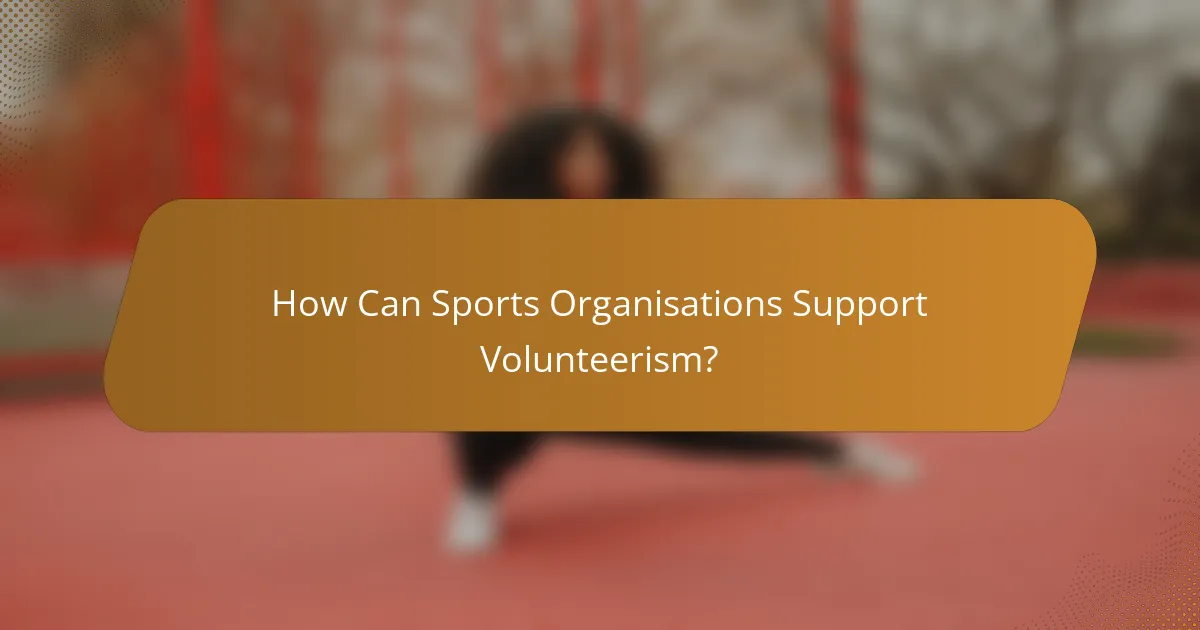
How Can Sports Organisations Support Volunteerism?
Sports organisations can support volunteerism by creating structured programmes that engage community members. These initiatives enhance local involvement, provide valuable experiences, and foster a sense of belonging.
Organisations can offer training sessions, mentorship opportunities, and recognition for volunteers. By promoting teamwork and community service, they strengthen relationships and improve local support for sports events.
Additionally, partnering with schools and community groups can expand volunteer reach. This collaboration not only increases participation but also cultivates future leaders in sports and community service.
Ultimately, effective volunteerism in sports leads to lasting community impact, enhancing both the sports environment and the lives of participants.
What strategies can organisations implement to recruit volunteers?
Organisations can implement various strategies to recruit volunteers effectively. First, they should leverage social media platforms to promote volunteer opportunities and engage potential volunteers. Hosting community events can also attract individuals by showcasing the organisation’s mission and impact. Offering flexible scheduling and roles tailored to different skills can widen the volunteer pool. Providing training and support fosters a welcoming environment, enhancing retention rates. Lastly, recognising and celebrating volunteers’ contributions builds a positive community culture, encouraging others to join.
How can organisations recognise and retain volunteers?
Organisations can recognise and retain volunteers by creating a supportive environment and acknowledging their contributions. Regular appreciation events, personalised feedback, and clear communication about the impact of their work enhance volunteer satisfaction.
Offering skill development opportunities and fostering a sense of community encourages long-term engagement. Unique attributes, such as tailored training programmes, can differentiate an organisation’s approach to volunteer management. As a result, volunteers feel valued and motivated to continue their involvement.
What partnerships can enhance volunteer programmes in sports?
Strategic partnerships can significantly enhance volunteer programmes in sports by providing resources, training, and community engagement. Collaborations with local businesses can offer sponsorships, while schools can facilitate volunteer recruitment. Nonprofits may provide expertise in volunteer management, and government agencies can assist with funding and outreach. Each partnership strengthens programme reach and impact, fostering a vibrant sports community.
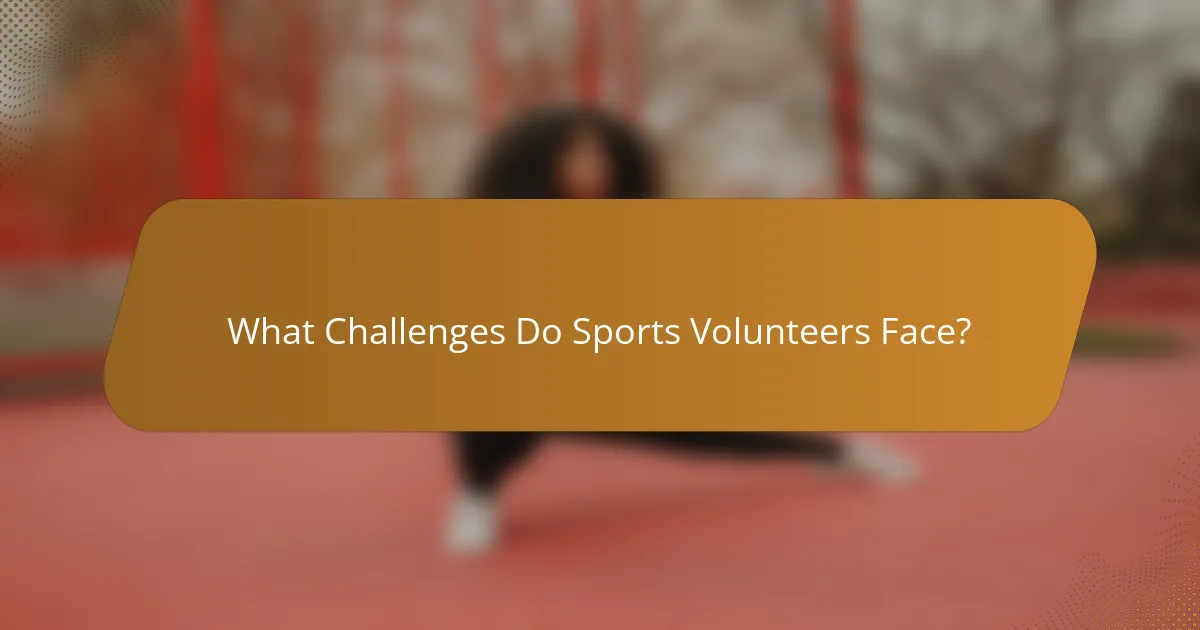
What Challenges Do Sports Volunteers Face?
Sports volunteers face challenges such as time constraints, lack of resources, and insufficient training. These obstacles can hinder their effectiveness and commitment. Additionally, volunteers may experience burnout due to high demands and limited recognition. Addressing these challenges is crucial for enhancing volunteer engagement and sustaining community impact.
How can volunteers overcome common obstacles in sports environments?
Volunteers can overcome common obstacles in sports environments by fostering strong communication, building teamwork, and seeking mentorship. Effective communication helps clarify roles and expectations, reducing confusion. Teamwork encourages collaboration, making tasks more manageable. Mentorship provides guidance, helping volunteers navigate challenges. These strategies enhance volunteer experiences and improve community impact.
What support systems are available for sports volunteers?
Sports volunteers can access various support systems, including training programmes, mentorship opportunities, and networking events. These systems enhance skills, foster community connections, and promote personal growth. Organisations often provide resources like guides and workshops to facilitate volunteer engagement. Additionally, recognition programmes acknowledge volunteer contributions, further motivating participation.
Which unique challenges arise in different sports settings?
Volunteerism in sports faces unique challenges influenced by various settings. These challenges include resource limitations, varying levels of community engagement, and differing organisational structures.
In team sports, volunteers may struggle with coordination due to multiple stakeholders, while individual sports often lack sufficient volunteer recruitment efforts. Additionally, seasonal sports can lead to fluctuating volunteer availability, complicating consistency in support.
Geographical barriers also play a role; rural areas may face difficulties in attracting volunteers compared to urban settings. Lastly, cultural differences can impact the willingness of individuals to engage in volunteer opportunities, requiring tailored approaches for effective outreach.

How is Volunteerism in Sports Evolving in 2025?
Volunteerism in sports is evolving in 2025 through increased digital engagement, diverse opportunities, and a focus on community impact. Organisations are leveraging technology to connect volunteers with events, enhancing accessibility and participation.
The rise of social media platforms fosters community building, allowing volunteers to share experiences and attract others. This shift encourages inclusivity, as more individuals from varied backgrounds join sports initiatives.
Additionally, sports organisations are prioritising sustainability and social responsibility. Volunteers are increasingly involved in initiatives that promote environmental awareness and community health, reflecting broader societal values.
As a result, volunteerism in sports is becoming more dynamic, adaptable, and aligned with contemporary social issues, enhancing its overall significance and reach.
What trends are shaping the future of sports volunteerism?
Volunteerism in sports is increasingly shaped by digital engagement, community needs, and inclusivity. The rise of social media encourages volunteers to connect and share experiences, enhancing recruitment and retention. Additionally, organisations are focusing on diverse opportunities that cater to various skill sets, making volunteerism more accessible. The emphasis on community impact drives initiatives that address local issues, fostering a sense of belonging and purpose among volunteers.
How has technology influenced volunteer engagement in sports?
Technology has significantly enhanced volunteer engagement in sports by streamlining communication and recruitment. Digital platforms facilitate outreach, enabling organisations to connect with potential volunteers efficiently. Social media campaigns raise awareness and increase participation, fostering community involvement. Data analytics help track volunteer contributions, improving management and retention strategies. Mobile applications allow volunteers to manage schedules and receive real-time updates, enhancing their overall experience. These advancements create a more connected and engaged volunteer community, ultimately benefiting sports organisations and the communities they serve.
What innovative practices are emerging in sports volunteer programmes?
Innovative practices in sports volunteer programmes include digital engagement platforms, flexible scheduling, and skill-based volunteering. These approaches enhance participation and improve volunteer retention. For example, mobile apps facilitate communication and task management, allowing volunteers to engage more effectively. Additionally, partnerships with local organisations create diverse opportunities, attracting a wider range of volunteers. As a result, these practices foster community involvement and strengthen the impact of sports events.
What are the best practices for successful sports volunteer initiatives?
Successful sports volunteer initiatives require clear goals, effective recruitment, training, and recognition of volunteers. Establishing strong partnerships with local organisations enhances community engagement.
1. Define clear objectives to align volunteers’ efforts with organisational goals.
2. Recruit from diverse backgrounds to bring varied skills and perspectives.
3. Provide comprehensive training to equip volunteers with necessary knowledge and skills.
4. Foster a supportive environment that encourages teamwork and communication.
5. Recognise and celebrate volunteer contributions to maintain motivation and commitment.
